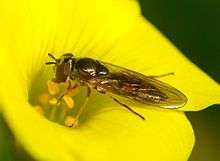Melanostoma
Melanostoma is a large genus of hoverflies.[2] Little is known of their biology, but they are suspected to be general predators of small insects in leaf litter.[3][4]
| Melanostoma | |
|---|---|
 | |
| Melanostoma scalare female | |
| Scientific classification | |
| Kingdom: | |
| Phylum: | |
| Class: | |
| Order: | |
| Family: | |
| Subfamily: | |
| Tribe: | |
| Genus: | Melanostoma Schiner, 1860 |
| Type species | |
| Musca millina[1] | |
Species[5]
- M. abdominale Shiraki, 1930
- M. aenoscutum Hull, 1964[1]
- M. algens Curran, 1931
- M. alpinum Szilády, 1942
- M. alticola Speiser, 1910[1]
- M. annulipes Macquart, 1842[1]
- M. apicale Bigot, 1884
- M. atrum Sack, 1932
- M. aurantiaca Becker, 1921
- M. babyssa (Walker, 1849)
- M. babyssola Speiser, 1924[1]
- M. bergmani Doesburg, 1966
- M. bicruciatum (Bigot, 1884)
- M. bituberculatum Loew, 1858[1]
- M. boreomontanum Mutin, 1986
- M. diffusum Hull, 1941[1]
- M. dubium (Zetterstedt, 1838)
- M. elongatum Matsumura, 1919
- M. eversmanni Enderlein, 1938
- M. fasciatum (Macquart, 1850)
- M. flavipenne Matsumura, 1919
- M. flavipleurum Hull, 1964[1]
- M. floripeta Speiser, 1910[1]
- M. fumivenosum Doesburg, 1966
- M. gedehense Meijere, 1914
- M. gymnocera Bigot, 1891[1]
- M. incisum Matsumura, 1916
- M. incompletum Becker, 1908 - Canarian endemic species
- M. incurvum Dirickx, 2001
- M. infuscatum Becker, 1909[1]
- M. keiseri Dirickx, 2001
- M. matilei Dirickx, 2001
- M. meijerei Goot, 1964
- M. mellinum (Linnaeus, 1758)
- M. motodomariense Matsumura, 1919
- M. normale Curran, 1931
- M. ochraceum Dirickx, 2001
- M. orientale Wiedemann, 1824
- M. otaniense Matsumura, 1919
- M. pedius Walker, 1852
- M. perinetense Dirickx, 2001
- M. pumicatum (Meigen, 1838)
- M. pyrophaenoides Speiser, 1910[1]
- M. quadrifasciatum Curran, 1928
- M. satyriphilum Hull, 1941[1]
- M. scalare (Fabricius, 1794)[1]
- M. simplex Doesburg, 1955
- M. subbituberculatum Kassebeer, 2000
- M. sulphuripes Hull, 1964[1]
- M. sylvarum Hull, 1941[1]
- M. teizonis Matsumura, 1919
- M. tenuis Matsumura, 1919
- M. tiantaiensis Huo & Zheng, 2003
- M. transversum Shiraki & Edashige, 1953
- M. trochanteratum Hull, 1964[1]
- M. tumescens Szilády, 1940
- M. univittatum Wiedemann, 1824
- M. violaceum Hull, 1964[1]
- M. wollastoni Wakeham-Dawson, Aguiar, Smit, McCullough & Wyatt, 2004
gollark: It's great!
gollark: I'm busy adding heavserver to *various* server lists.
gollark: I agree!
gollark: Oh bee this is very broken, please readd me to the palaiological group.
gollark: No, it seems to just hang.
References
- Smith, Kenneth G.V.; Vockeroth, J.R. (1980). Crosskey, R.W. (ed.). Catalogue of the Diptera of the Afrotropical Region (Print)
|format=requires|url=(help). London: British museum (Natural History). pp. 1–1436. ISBN 0565-00821-8. - Stubbs, Alan E.; Falk, Steven J (1983). British Hoverflies: An Illustrated Identification Guide (2nd ed.). London: British Entomological and Natural History Society. pp. 253, xvpp. ISBN 1-899935-03-7.
- Ball, S.G.; Morris, R.K.A. (2000). Provisional atlas of British hoverflies (Diptera, Syrphidae). Monks Wood, UK: Biological Record Centre. pp. 167 pages. ISBN 1-870393-54-6.
- Van Veen, M.P. (2004). Hoverflies of Northwest Europe, Identification Keys to the Syrphidae (Hardback). Utrecht: KNNV Publishing. p. 254. ISBN 90-5011-199-8.
- "Melanostoma". Encyclopedia of Life, available from http://eol.org/pages/25610/entries/33710029/overview. Accessed on 25 January 2012
| Wikispecies has information related to Melanostoma |
This article is issued from Wikipedia. The text is licensed under Creative Commons - Attribution - Sharealike. Additional terms may apply for the media files.